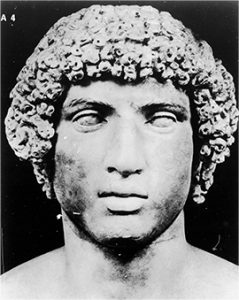Classical archaeologist and art historian Sinclair Bell will explore how race and ethnicity were expressed by artists in the Roman Empire for the Illinois State University Speaker Series.
His presentation, “Race and Representation in the Roman Empire: African Athletes as Case Study” will be at noon, Thursday, March 29, at the University Galleries, 11 Uptown Circle, Suite 103, in Normal. Sponsored by the Harold K. Sage Fund, the Illinois State University Foundation, and the School of Art, the event is free and open to the public.
Bell is an associate professor of art history at Northern Illinois University. His research focuses on the art and archaeology of the Etruscans, spectacles in the Roman imperial period, and the visual representation of slaves and foreigners in Roman imperial art. Bell has coauthored or coedited five books: A Companion to the Etruscans, Free at Last! The Impact of Freed Slaves on the Roman Empire, New Perspectives on Etruria and Early Rome, Role Models in the Roman World: Identity and Assimilation, and Games and Festivals in Classical Antiquity. He is currently the Book Reviews editor for the journal, Etruscan Studies.
For his talk, Bell will look at visual representations of African athletes who competed for glory in agonistic competitions, circus races, and amphitheater combats during the imperial period. The first part of the lecture will survey some of the ways in which African athletes were “imag(in)ed” in Roman art, from their depiction in terracotta figurines to sprawling mosaics. The second part will consider a few key instances in which modern scholars, especially historians of ancient slavery, have misinterpreted that visual evidence, and discuss what these attempts reveal about our own prejudices and misconceptions about the visualization of race and ethnicity in the Roman Empire.
The Illinois State University Speaker Series seeks to bring innovative and enlightening speakers to the campus with the aim of providing the community with a platform to foster dialogue, cultivate enriching ideas, and continue an appreciation of learning as an active and lifelong process. All talks are free and open to the public.



